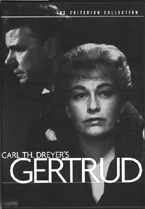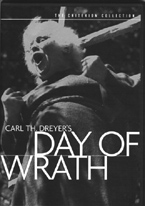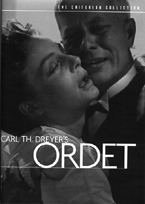| Release List | Reviews | Price Search | Shop | Newsletter | Forum | DVD Giveaways | Blu-Ray/ HD DVD | Advertise |
| Reviews & Columns |
|
Reviews DVD TV on DVD Blu-ray International DVDs Theatrical Reviews by Studio Video Games Features Collector Series DVDs Easter Egg Database Interviews DVD Talk TV DVD Talk Radio Feature Articles Columns Anime Talk DVD Savant HD Talk Horror DVDs Silent DVD
|
DVD Talk Forum |
|
|
| Resources |
|
DVD Price Search Customer Service #'s RCE Info Links |
|
Columns
|
 |
Boxed Set |

|
Gertrud Criterion 127 1964 / V&W / 1:78 anamorphic 16:9 / 119m. Starring Nina Pens Rode, Bendt Rothe, Ebbe Rode, Baard Owe, Axel Strobye. Cinematography Arne Abrahamsen, Henning Bendtsen Art Director Kai Rasch Film Editor Edith Schlüssel Original Music Jorgen Jersild Writing credits Carl Theodor Dreyer from a play by Hjalmar Söderberg Produced by Jorgen Nielsen Directed by Carl Theodor Dreyer |
Gertrud is the show Savant watched first, and it was tough sledding simply because it is so different. It is extremely stylized and slow, appearing at first to be almost a parody of the Bergman-type of story where everyone is morbidly obsessed with their own inner being. The actors move slowly and the settings and camera viewpoints are rigidly restrained. The characters seldom seem to make eye contact with each other and barely blink. Most dialogue is delivered to the opposite wall instead of fellow actors. It's not a movie likely to be tolerated by the Planet of the Apes crowd.
The characters and story grow in interest and a great deal of curiosity arises from wondering how Gertrud will resolve her romantic dilemma. Although the ending is strangely satisfying, Gertrud seems more of a doggedly persistent exercise in style than something experienced as a movie. Gertrud's insistence on living an emotional existence is fascinating considering the formal and repressed atmosphere, and the one instance when a character breaks down is jarring. But overall involvement is difficult. Savant found himself reading the subtitles as if reading a book, responding to the words more than the images.
All three of these films have remarkable, radiant performances by Danish actresses. Nina Pens Rode carries almost every scene of Gertrud and portrays a character every bit as complicated and human as the heroine of Ibsen's A Doll's House. That great play seems simpleminded next to the complex human puzzle presented here.
Hailing from 1964, this widescreen B&W film is represented in a flawless anamorphic transfer with crystal clear sound. The extras include archival footage, a stills gallery and some interview excerpts with the actors not used in the documentary included in the boxed set.
|
Day of Wrath Criterion 125 1943 / B&W / 1:37 flat / 110m. / Vredens dag Starring Thorkild Roose, Lisbeth Movin, Sigrid Neiiendam, Preben Lerdorff Rye, Anna Svierkier. Cinematography Karl Andersson Art Direction Erik Aaes Film Editor Anne Marie Petersen, Edith Schlüssel Original Music Poul Schierbeck Writing credits Carl Theodor Dreyer, Poul Knudsen from the novel Anne Pedersdotter by Hans Wiers-Jenssens Produced and Directed by Carl Theodor Dreyer |
 |
If people have seen a Dreyer film beyond Vampyr and The Passion of Jeanne D'Arc, Day of Wrath tends to be the one. Savant can happily report that it's even better than I remembered it. The pace is fast, even if people do seem to move with a studied deliberation. The soundtrack seems to be composed of the silence between words. The actors are simply excellent, with Lisbeth Movin giving the strangest, most ambiguous female performance I can remember. She's a child bride living in a horribly repressed household with a teetering old husband and a horrid mother-in-law that despises her. When Anne's inner sexuality surfaces In these surroundings it can't help but seem satanic, even to her.
The spiritual horror film Day of Wrath seems to be a condemnation of the inquisitors of the Holy Office and a criticism of religion... at first. Unlike the powerful but obvious Witchfinder General (The Conqueror Worm) this tale has no villains, only people playing their pre-ordained roles in a repressed society where the church seems to rule all. Absalon may be pitiless but he is also sincere to the bone, and willing to be ruthlessly merciless with himself when made aware of his shortcomings. The cruelest torturer is a man with a soul trying to do his best. There's not a shred of irony or finger-pointing in the whole show. This makes the horror all the more disturbing -- with truly decent people denouncing one another right and left.
The best thing about the movie are the uncanny visuals, which would seem to be informed by the weirdness of Vampyr twelve years before. Fairly indescribable creepy sensations accompany what should be innocuous setups, such as a simple image of Anne listening at a doorway. The straight-laced household has a cabinet for everything and virtuous labor is expected of everyone. Anne's eavesdropping evokes the strange feeling of a demon, simply because she defies the house rule. The actress conveys an assertive spirit that this ultra-repressed world can only see as wanton. We feel Anne's spiritual force and recoil at the danger it represents.
The conclusion is utterly unpredictable and horrifyingly appropriate. Dies Irae, the 'Day of Wrath' hymn, is given translated words that will chill the blood of any churchgoer: It is the vocabulary of vampire movies, but set in real life, real history.
It's amazing how well preserved (restored) is Day of Wrath, a 60 year-old movie filmed during the Nazi occupation of Denmark. The transfer must be from prime elements, as it makes the old prints seem dank and fuzzy. The movie has beautifully-designed settings, now full of details I never saw before. The extras are another nice still gallery and set of interview excerpts. Now a beautiful elderly lady, the still mesmerizing actress Lisbeth Movin is featured in one interview section.

|
Ordet Criterion 126 1955 / B&W / 1:37 flat / 126m. / The Word Starring Henrik Malberg, Emil Hass Christensen, Preben Lerdorff Rye, Cay Kristiansen, Birgitte Federspiel, Ann Elisabeth Rud, Susanne Rud, Ejnar Federspiel. Cinematography Henning Bendtsen, John Carlsen, Erik Wittrup Willumsen Production Designer Erik Aaes Film Editor Edith Schlüssel Original Music Poul Schierbeck Writing credits Carl Theodor Dreyer from a story by Kaj Munk Produced by Carl Theodor Dreyer, Erik Nielsen, Tage Nielsen Directed by Carl Theodor Dreyer |
Savant confesses that he kept Ordet for last because the jacket copy said it was about a crisis of faith. It starts off as slowly as had Gertrud but quickly sets up a complicated drama in the Borgen farmhouse that gets more interesting by the minute. It also constructs some cinema-psychic connections that made me feel I was watching something I was, shall we say, ordained to see. I finally recognized the beautiful actress Birgitte Federspiel, young in 1955, as one of the minister's daughters in the delightful Babette's Feast made more than thirty years later. The harsh but loving religious overtones of that movie began to inform the collection of troubled faiths in this one. Secondly, I couldn't help but feel that Ordet was helping to explain another strange movie, William Wellman's Track of the Cat, a drama with stark settings and moody characters that never before made full sense. And finally, I realized that the most modern Danish film I've seen, Lars Von Trier's Breaking The Waves, must have been inspired by Ordet. For this is nothing less than a miracle story.
Maybe it was a cumulative spell, but by the end of Ordet I was totally transported and experienced a little dramatic miracle of my own. Unlike the Von Trier film there were again no villains, no misunderstandings and no demonized establishment to blame for the Job-like trials imposed on the Borgens. The suffering had the weight of real life lived by real, suffering souls, ordinary people trying their hardest to remain true to their beliefs and behave decently toward one another. I won't go into more detail for fear of ruining the impact of Dreyer's film. It was the longest and maybe even the slowest of all three films in the set, but it's the one I can't wait to see again.
The heartbreakingly charming Birgitte Federspiel is the subject of the deleted interview footage on Ordet and the pleasure of seeing her smiling face after the ordeal of the movie was truly uplifting. The overall extra in the boxed set is a fourth disc containing a 1995 documentary entitled Carl Theodore Dreyer - My Métier. This plain-spoken and visually distinguished show covers the director's unique life and films with a balance of clips and interviews. The cameramen and actors all behave as if working with Dreyer was the high point of their lives. Dreyer made only thirteen features and went through long periods of inactivity. Yet he never became frustrated or bitter, or considered himself an unfulfilled genius with a career made up of partially filmed and abandoned 'masterpieces.' The idea of a film director as an uncompromising artist has become extinct in a film world dominated by commercialism, and Dreyer's story is as inspirational as the spiritual movies he made. Savant feels very privileged to have just been able to see them, and Criterion's stature has just taken another step upward.
On a scale of Excellent, Good, Fair, and Poor,
Gertrud, Day of Wrath, Ordet rate:
Movie: Excellent
Video: Excellent
Sound: Excellent
Supplements: stills, interview outtakes
Packaging: Amaray case
Reviewed: August 21, 2001
|
|
| Coming Soon |
|
|
| Special Offers |
|
|
| Columns |
| Home | Release List | Coupons | Shop | Reviews | Forum | Video Games | Price Search | Advertise |









